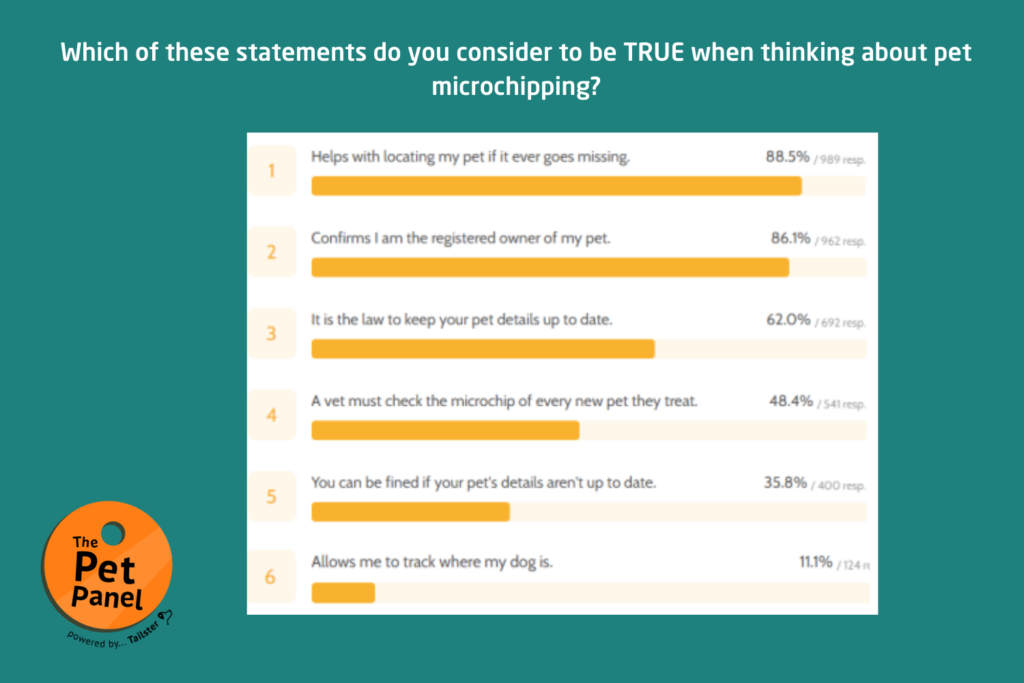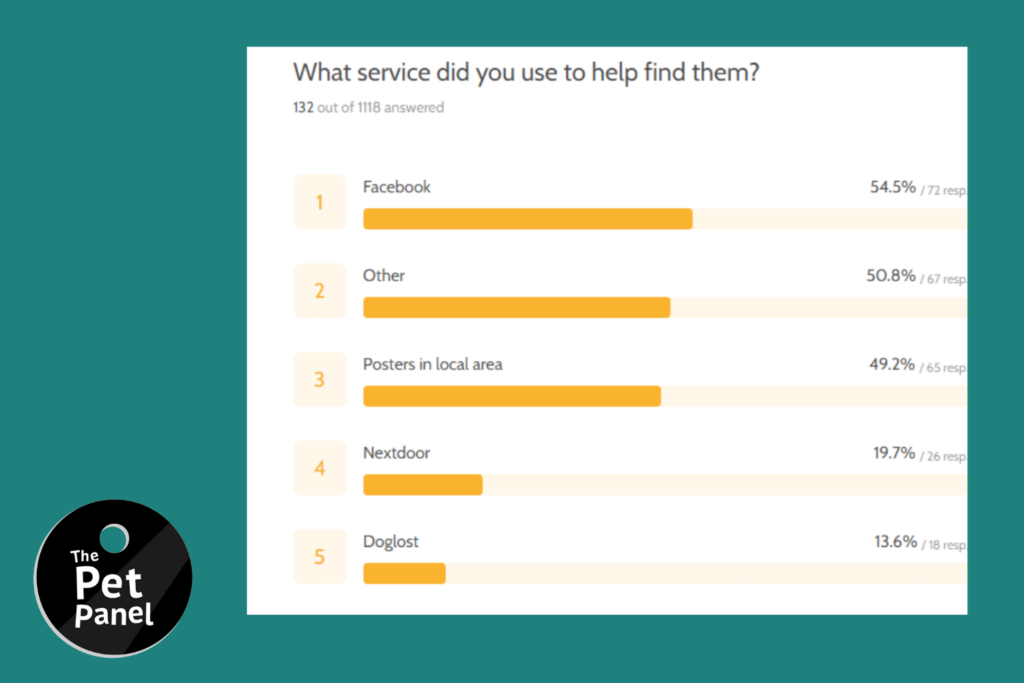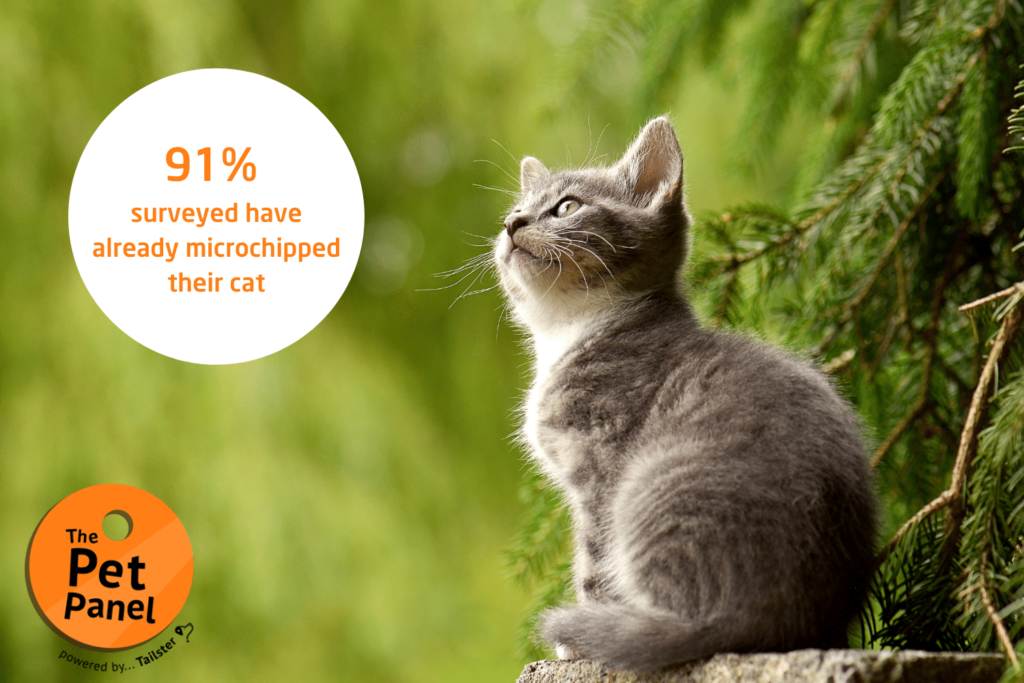As we come past the 5 year anniversary of dog microchipping being made compulsory, and talk of the same happening for cats – we undertook a survey of members of the Tailster Pet Panel to understand consumer thoughts around matters pertaining to microchipping.
Since the compulsory microchipping of dogs was introduced in 2016, all dog owners must ensure their dog is microchipped and details are kept up to date. A £500 fine may be coming your way if those details are indeed incorrect.
This is vital to reunite the over 100,000 dogs which are picked up from the UK’s streets having gone missing or been stolen every year. We know how important it is to ensure that your details are kept up to date, if and when the time arises for the microchip to be scanned to reunite your missing pet with you, but we wanted to understand if this sentiment was shared by the broader pet owning population.
Below are some of the headline pullouts from the Pet Panel survey in relation to microchipping.
Which database is my pet microchip registered to?

We first asked pet owners whether they knew who their pet microchip details were registered with. That would be the starting point for knowing where to go in order to keep details updated.
There are currently 17 national databases with which pet owners can register their pet that are DEFRA registered. Scalewise, we see a few market leaders (when a pet owner remembers their provider!), and identified UK Pet Chip Registry / Allpaws.info which appears in the list despite not being DEFRA compliant.
12% of the panel surveyed had microchips for pets with different providers, and therefore have to deal with different providers when keeping their contact details up to date.
An alarming 34.9% of pet owners surveyed did not know which database their pet was registered with. On this basis, it is unlikely that they would have kept their details up to date, and also have probably not heard from their microchip database provider to remind them to keep themselves updated. This also speaks to a lack of brand recognition in the space beyond the two or three largest pet microchip databases – Petlog, Identibase and PetTrac.
What do you believe is true about your pet microchip?
We presented pet owners with a list of statements and asked owners to select multiple statements that they believed to be true.
Pet owners understand the benefits of microchipping but this is to be expected due to the large proportion of our panel base who had already gone through the process of microchipping.

88.5% of pet owners understood that the benefit of the microchip is that the registered details would help with locating my pet if it ever goes missing. It is unclear whether they believed the microchip had some form of location tracker, rather than the realities – the microchip is an identifier that can allow specific people to access the details that are attached to the microchip in terms of pet re-unification.
86.1% of pet owners understood that the microchip allowed identification of the registered owner of the pet – which is important in the case of pet theft.
A lower 62% were aware that it is the law to keep pet details up to date. Owners and breeders who do not get their dog microchipped and registered with an approved DEFRA database face a fine of up to £500 and could face criminal prosecution. This also includes if contact details change and you don’t update your details. Based on prior findings, it is a concern that almost a third of our surveyed members did not know who their database provider was.
Just under 50% of pet owners believe that it is the vet’s responsibility to check the microchip of every new pet they treat. Group led petitions have hit over 100,000 signatures and reached parliamentary discussions – such as:
Ferns Law (requesting that pets’ microchips are scanned by vets, authorities and rescues at a pet’s 1st consultation or yearly checkup and matched against the microchipping database), and
Tuks Law (to make scanning of microchips compulsory to check for rescue back up contact details on microchips and to confirm the person presenting the animal is registered to the microchip before the euthanisation of a healthy or treatable animal.)
Whilst these have been successful in shining a light on the situation, it appears that many pet owners believe that the scanning of pets in these circumstances is already happening, or are already compulsory.
36% of pet owners are aware that they could be fined if their pet’s details are not up to date – it’s not currently clear whether the threat of a fine is enough to convince people it is necessary, but rather it should be explained as to why having up to date details is so important to being re-united with a missing pet.
11% of pet owners believed the actual microchip allowed the service to track the dog through perhaps GPS – demonstrating that educating the market is likely required on this aspect.
Perception could be considered greater than the reality – people believe they are protected and chipping brings security whilst we are aware that the reality of vets scanning every new pet they treats is likely lower.
What do microchipping databases do in relation to lost pets?

When thinking about registering with a microchip provider, offering a lost pet feature features highly for a majority of pet owners, with 78% of respondents rating it a 5/5 on the importance scale.
Just shy of 12% of the surveyed panel members had been through the painful experience of having their pet go missing. A range of options or services were used by pet owners in that situation.

Interestingly, pet owners tend to take the matter of finding their pet into their own hands – leveraging social media, going door to door and using excellent volunteer services such as Doglost. It seems that many will not think to go to their microchip database where details are registered when a pet goes missing. A quick glance at each of the providers does not demonstrate much in pro-active statistics or services that actively help pet owners in their search for a missing pet.
How up to date are your details with your microchip database?

The key to effective microchipping – is that the data is kept up to date. To be exact, if the details of the pet owner are incorrect or out of date – if a pet goes missing, it is very difficult to reunite the pet with its rightful owner. If the phone number is incorrect, or the address has not been changed, or email addresses are missing – then pet re-unification becomes significantly difficult. Dogs and cats will then be passed onto rescues or to wardens who will also struggle to get in touch with the pet owner in the same way. It is therefore vital that pet owners keep their details up to date. We’ve already seen that a third of pet owners do not know which database their pets are registered to. It is likely therefore, they will not know the actual microchip details for their pet too in order to check.
Interesting facts to pull out –
- 22% of pet owners that have moved house had not thought about their requirement to update microchip details.
- Of the pet owners who did not know which database their pet microchip details were registered on, 27% had moved house since.
- 73% of pet owners had experienced a pet passing away – 50% of them had informed their microchip database of their passing. The quid pro quo for this is that 50% of pet owners had not notified their database. It appears that once a pet passes away, the security a pet owner recieves from a microchipping service is no longer a concern. At this point, the legal factor is not enough of a driver for a pet owner to notify their microchip database.
There remains a question around whether extensive education of the pet owner population in relation to microchipping is required. Whilst it is considered light admin, it is vital and a legal requirement to ensure details are kept up to date. If these are incorrect, it may be too late to rectify. We note that all databases charge fees to update contact details which may be a prohibitor to keeping pet details up to date.
Microchipping of cats

A recent consultation for cat microchipping has been launched with the government seeking views on introducing compulsory cat microchipping in England as per for their dog counterparts. Initial estimates from the government that that just over 70% of owned cats are currently microchipped.
Of the panel members surveyed, who owned a cat, 91% had already chipped their cat and of those who hadn’t were not adverse to the idea of having their cat microchipped.
21.5% of cat owners surveyed had experienced their pet go missing – significantly higher than the proportion for dogs – an indication of the free roaming nature of pets and highlighting the importance of having a microchip with up to date contact details.
More about the pet panel
The Tailster Pet Panel consists of fully opted-in pet owners with over 100,000 pets across a range of species, breeds, income, and socio-demographics. You can join the panel at https://tailsterperks.com
The survey in question was filled in by 1400 participants specifically targeting dog owners and cat owners. Based on the number of participants and pet population, the margin of error is +-3%.
